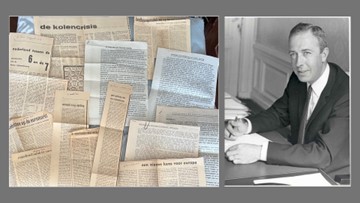The Future of Europe and the Label Industry: Going Back to the Roots
FINAT recently announced the presence of former Belgian PM and MEP Guy Verhofstadt as the opening keynote of the European Label Forum 2024 in Athens. Reflecting on this, I delved into the origins of European integration, tracing back to 1958, the founding year of both the EU's predecessor, the European Economic Community (EEC), and FINAT.
1958 also marked the graduation of our former SG, my father Mans Lejeune, from Tilburg University. Equipped with a degree in International Economics, Mans witnessed firsthand the events leading to the EEC's foundation. His role as the European Affairs columnist for a Dutch opinion weekly, under the mentorship of Politician and Vice-Chairman of the European Parliament Pieter Blaisse, offered valuable insights into European affairs. Three contradictions.

Contradiction 1: Strategic Autonomy vs. National Interest
Mans highlighted the tension between strategic autonomy and national interests during the Coal Crisis in the ECSC. He noted, "The coal crisis has created a clear crisis of authority... faced with a choice between community-based solutions and those inspired by national egoism."
This tension persists today. Strategic autonomy and industrial politics are back on the agenda, as evident in conflicts over issues like climate action, nature preservation and energy transition, where supranational policies clash with national agendas.
Two years ago, also the European label community was confronted with a lack of critical raw materials (paper face and release liner, consumables, machine components) and FINAT appealed to the European Union for an EU-wide strategic dialogue on this matter.
Contradiction 2: Free Trade vs. Socio-economic Integration
Discussions post-Treaty of Rome revolved around accelerating its implementation, prompting concerns about dividing Western Europe into two economic blocs: the European Free Trade Association (EFTA), and the EEC. Mans cautioned against rushing socio-economic integration, emphasising the deep-rooted national consciousness.
Over the years, EU's regulations have evolved, creating a level playing field in various domains, from chemicals to privacy and most recently AI, all regulations that have become de facto global standards since they determine access to one of the largest common markets worldwide. At the moment, the adoption of the EU Packaging and Packaging Waste Regulation (PPWR) is only a matter of time.
These examples have also driven industry collaboration and standardisation. In the 1960s, FINAT grew from 30 founding members to over 250 companies (620 today). Its first deliverables were the standard FINAT Test Methods. More recently, industry consortia like CELAB and UVFoodSafe have been set up under the FINAT umbrella to facilitate pre-competitive collaboration.
Contradiction 3: National Sovereignty vs. European Unity
Mans likened European institutions to business structures, underscoring the theme of democratic accountability. He stressed the need to bridge the gap between European politics and the broader population through mechanisms like European elections.
Ironically today, as populist sentiments challenge the ‘non-elected’ EU governance, the call for national competence-based governments rises, exemplified by technocratic (crisis) cabinets in Italy, Greece, and Belgium in the past 10-15 years, and with Dutch negotiations about a so-called ‘Programme Cabinet’ underway.
Apparently, democratic accountability can be at odds with the need for socio-economic realism. Associations like FINAT can bridge the gap and make sure that a European level playing field is created that builds the scale for the necessary investments in innovation and sustainability.
In conclusion, the tensions that Mans identified decades ago remain relevant today. Navigating these contradictions requires aligning national interests with supranational goals, fostering socio-economic integration while respecting sovereignty, and enhancing democratic accountability in European governance.
The contradictions also drove Mans to establish his own company for business collaboration, Bureau Lejeune in 1964, six years before FINAT became one of its clients, a partnership that has lasted till today.






